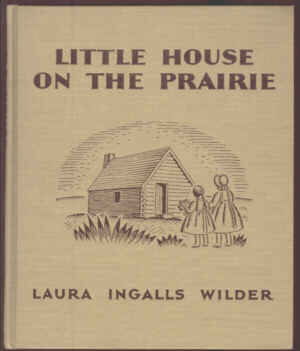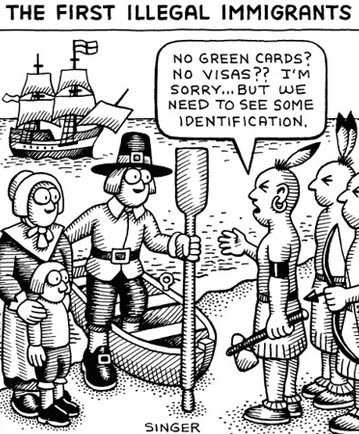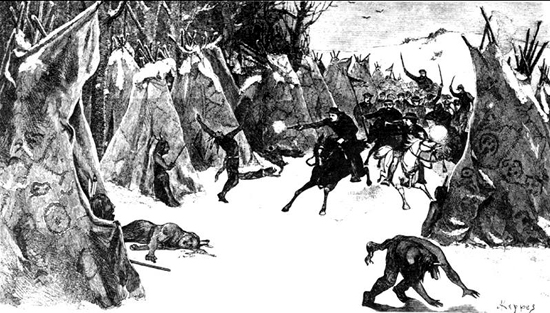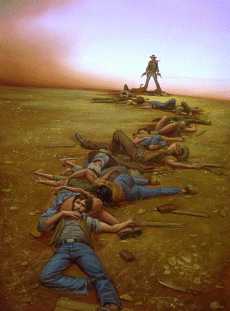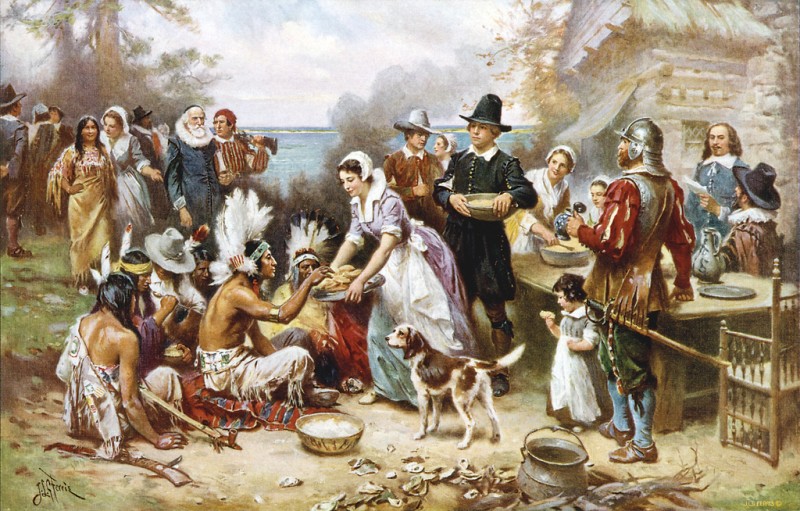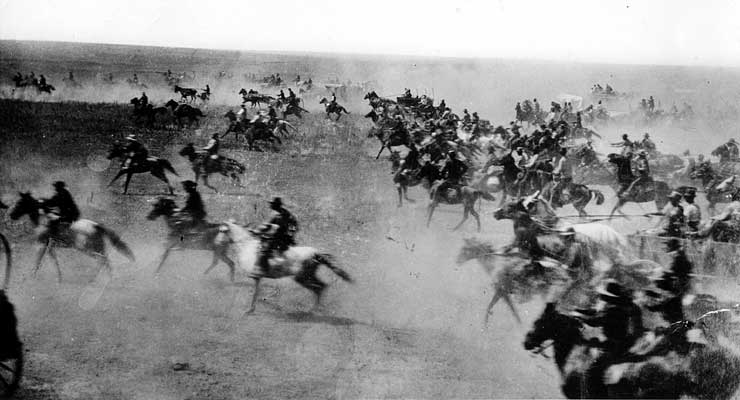Another day, another entry in the
Rand/Stossel termination agenda for Indians:
American Indians Putting Faith in Government 'Help'?By Chuck RogerIn New Mexico's state capitol, a local newspaper reports that Santa Fe Indian School students are "watching with bated breath" for Governor Susana Martinez to sign a bill that would create "culturally sensitive programs" designed "to help Native American communities deal with teen suicides."
The situation is tragic on two levels.
First, the high suicide rate attests to social problems endemic in Indian communities. But the second tragedy is even worse, for it compounds the first. No one, especially American Indians, should put faith in government to "deal with" anything, much less something as horrible as suicide. Government has consistently worsened the plight of the Indians with poverty-perpetuating, will-weakening, assimilation-discouraging "help."
The bill in question, sponsored by a Democrat state senator, would also provide resources to address general mental health issues of New Mexico's Indians. The effort would typify the emotional liberal response to problems like the ills that afflict Indian communities.
It doesn't seem to occur to liberals that the solution to social problems in isolated communities could be to end the isolation. Psychologists have understood for decades that increased self-reliance, encouraged by the rewards earned by self-reliant people, has the power to eliminate depression. Yet big-government liberals incessantly fall back on feel-good but ineffective "interventions" orchestrated by governmental central planners.Comment: No doubt you recognize the key codewords here: End the isolation. Stop discouraging assimilation. In other words, Indians should give up their land, their
reservations, and their
sovereignty. They should forget about the treaty rights that guarantee them certain benefits.
It doesn't matter what the Constitution and various court decisions say. We stripped them of their land, cultures, languages, and religions. Now let's strip them of the money that was supposed to compensate them. They're only "dirty redskins," so who cares if we rob them twice? We'll rob them as many times as it takes until they shrivel up and die.
Pay close attention to what this Jolly Roger is saying. Indians are suffering high rates of suicide, but let's do nothing to help them. Maybe they'll help themselves and maybe they won't. If they don't, problem solved. Once they're dead we can take their remaining land and resources without listening to them whine about their "rights."
This is pure social Darwinism: survival of the fittest. Those that overcome depression on their own deserve to live; those that don't deserve to die. Roger is more concerned about his free-market ideology than saving actual lives. If
self-reliance isn't the cure-all he thinks it is...oh, well, they're only
savages. No big loss to humanity.
Rugged individualists kill themselvesRoger reguritates his
free-market propaganda without a shred of evidence except a vague reference to psychologists. This is anti-intellectual, asinine nonsense for several reasons.
1) We could point to many, many government programs that work for all Americans. The military. Water and electricity provision. Homeland security. The highway system. Food inspections. The air-traffic system. Public universities. National, state, and local parks. Public libraries. Home mortgage deductions. Student loans. Etc., etc., etc.
Roger says we shouldn't put faith in government to "deal with" anything. Does he really think we should privatize our troops, our highways, and our libraries? Or is he too stupid to realize that government does many things well? (Social Security has lower costs than comparable private programs, for instance.)
2) Roger obviously knows nothing about
suicide. Guess which states have the highest suicide rates?
Ranking America's Mental Health: An Analysis of Depression Across the StatesIn terms of 2004 suicide rates, the District of Columbia was the lowest, followed by New York and Massachusetts. Alaska had the highest suicide rate, followed by Nevada and New Mexico.Here are the ten most suicidal states:
West Virginia
Arizona
Colorado
Utah
Idaho
Wyoming
Montana
New Mexico
Nevada
Alaska
Colorado and New Mexico are arguably swing states, but every other state on the list is solidly conservative. These are exactly the states where people are supposedly rugged individualists. Where people supposedly hate the
nanny state--when they're not receiving subsidies for their water, grazing, or mineral rights, that is--and rely on themselves. To put it bluntly, self-reliant people have the highest suicide rates in America.
It's not hard to understand why. Struggling to survive on your own is tough. The cure for feelings of loneliness and isolation isn't more loneliness and isolation. It's a caring web of social connections--the kind memorialized in the phrase "It takes a village."
Not everyone can live up to America's
cowboy standard: the "virtue" embodied in
John Wayne and
Ronald Reagan. If you lived in a conservative state where they preached God and family while people lied and cheated, you'd feel whipsawed by the hypocrisy also. If it was bad enough, you might become depressed or suicidal too.
Suicide prevention works3) Roger obviously knows nothing about suicide prevention programs, either. An article appearing the same day outlines the facts Roger is ignorant of:
Response plan needed on suicide epidemicMontanans may never know exactly what caused the spike in suicides among the youth of the Fort Peck Indian Reservation--but we have a good idea of how to stop it.
The first step is to urge the U.S. Public Health Service to return to the reservation and provide much-needed counseling and mental health care. The next step is to see to it that these services are available to Fort Peck families on a long-term basis as part of a comprehensive safety net that catches these kids well before they fall through the cracks.
The heartbreaking spate of suicides by Native American children in Montana reached horrendous levels last school year, when five Poplar Middle School children killed themselves and 20 more students attempted suicide on the Fort Peck reservation.
Assiniboine and Sioux leaders recognized the situation for what it is--a crisis--and in response to their crisis declaration, federal emergency teams came to the reservation to shore up mental health services, study the situation and make some recommendations.
And for 90 days, there were no suicides.Duhhh. Unless you're a stupid twit, you know that mental health problems aren't solved with "self-reliance." They're solved with mental health services that require money. These services help military veterans with PTSD and they help others the same way.
If you think they don't work, let's throw our traumatized soldiers out on their asses and let them fend for themselves. If this treatment is good enough for Indians, it's good enough for everyone.
Sheesh.
For conservatives like Roger who are ignorant of American history, we've tried allocating the Indians' land...forcing them to assimilate...and terminating their tribes. None of these policies worked. Don't take my word for it, dumbasses, look it up in the historical record. Stop pontificating about your ivory-tower theories and start dealing with reality.
There's no proven connection between government services for military veterans, the elderly, or women with children and suicide rates. There's no proven connection between government services for Indians and suicide rates, either. If "unearned" money made people weak and helpless, millions of trust-fund babies would be committing suicide. That's obviously not the case.
For more on the subject, see
Didier: Stop protecting the weakTea Party leader posts racist "satire"Why Americans hate welfareCapitalism gets comeuppanceWesterners = freeloadersBelow: Cowboy Bush grows weak and helpless living off government handouts (his presidential pension).

